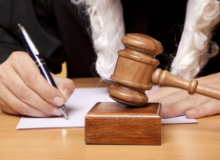Environmental Protection Series No. 5: Countermeasures to Environmental Administrative Punishment and Hearing Strategies
2019.09.29 ZHU, He (George)、NI, Tianling (Carey Nee)、LIU, Xin (Lea)
With the visit of the Central Government’s Environmental Compliance Inspection Committee (“Inspection Committee”) to Shanghai, Fujian, Hainan, Chongqing, Gansu, Qinghai and two other central enterprises from July 10 to 15 this year, the environmental protection bureau (“EPB”) has launched the second round of the “Environmental Protection Storm”. As of September 5 this year, the Inspection Committee has ordered 8,507 enterprises to take corrective actions, investigated 2,942 enterprises and imposed a total penalty amount of around RMB 189 million. Following the large penalty amounts, the number of corporate hearings and appeals handled by the EPB has significantly increased. In this context, we will briefly introduce the key risks and issues in dealing with environmental administrative cases from a corporate perspective.
I. Preparation – Enterprises should revisit the EPB’s past inspection results and correction orders
In the context of the second round of the “Environmental Protection Storm”, the EPB investigates environmental violations in a stricter way and imposes large penalties in light of enterprises’ past environmental issues. Therefore, in addition to daily environmental compliance, enterprises should specifically revisit the correction suggestions and requirements raised by the EPB during on-site investigations, and preserve in writing the correction statements and correspondence with the EPB, in order to mitigate the risk of the correction being deemed a “superficial correction”, a “pretend correction” or a “perfunctory correction” and therefore be penalized or be otherwise administratively punished. Enterprises should also be aware of and actively deal with internal personnel disputes and environmental claims from neighboring regions, in order to address and eliminate potential risks in connection with any potential complaints or claims.
II. Learning from Experience – Enterprises should take prompt countermeasures to the proposed penalty notifications (including the hearing notifications)
As our last article “Environmental Protection Series 4 – Challenges and Countermeasures regarding Environmental Compliance Inspections” discussed, enterprises should submit hearing application and appeal letters in accordance with the relevant procedural and timeline requirements. Different approaches and countermeasures undertaken by enterprises to the penalty notifications may result in different penalties. For instance, say Company A and Company B have different practical experience. After receiving the proposed penalty notification, Company A takes an omission approach without applying for a hearing or submitting an appeal letter. On the contrary, Company B pays strict attention when it receives the proposed penalty notification and immediately applies for a hearing. The legal representative of Company B also makes an appointment with the EPB in the upcoming days and presents various facts and arguments, which are documented by the EPB in the appeal record. However, in this appeal record, the inexperienced legal representative discloses facts that are not completely accurate.
On the other hand, let’s say Company A misses the opportunity of a hearing and appeal by taking an omission, which would be deemed as a waste of a remedy opportunity from a legal perspective, despite the fact that Company A may still defend itself in an administrative review with superior EPBs or bring the dispute to the courts; in terms of Company B, the misrepresentation of Company B brings about unnecessary complications to its defense in the hearing. Therefore, it is advisable for enterprises that once they become aware of an administrative case, they should consider engaging professional environmental lawyers to discuss countermeasures and strategies as well as prepare the appeal letter, participate in the hearing, taking into account their past experience, the likely penalty amount and the difficulties of the case.
Besides the above proposed penalty and/or hearing notifications, enterprises should also pay attention to the “Decision regarding the Correction Order of Violation Acts” issued by the EPB together with the notifications. In the event that the Decision specifies a time limit for correcting the violating acts but enterprises fail to correct such acts, daily accumulative penalties may be triggered and may lead to a large fine. Given this, if there are acts by enterprises which violate laws, enterprises should prepare for the appeal and hearing, and, cease or correct the suspected violation acts immediately after receiving the Decision and report the written correction statement to the EPB.
III. Attending The Hearing by the EPB – Key points for enterprises to participate in the hearing procedures
Enterprises may usually appoint one or two representatives to participate in the hearing and expression on behalf of enterprises, while other participants in the hearing are not allowed to make any statements. According to our practical experience, a suggested representative combination would consist of a senior officer of the enterprise (who is familiar with the operation of the enterprise) and an environmental lawyer. The senior officer and lawyer would focus on the statement of facts and the application of laws respectively. Prior to the hearing, enterprises should determine the defense strategy of the hearing, i.e. to determine the combination and tradeoff between questioning the facts, challenging the law applications, and apply for a non-imposition, exemption or reduction of penalties. The key point for the hearing is to make statements strictly following the defense strategy, and answer unexpected questions by investigators and moderators of the hearing in accordance with the principles of accuracy, truthfulness, relevance and conciseness, in order to achieve an outcome of non-imposition of penalties (or exemption or reduction of penalties) on a reasonable basis. If enterprises and their environmental lawyers fully cooperate, it is not uncommon that they would finally achieve an outcome of non-imposition of penalties or a significant reduction in the penalty amount.
IV. Casting an anchor – Enterprises should improve their environmental compliance awareness and risk control ability
Even if enterprises have achieved positive results of avoiding penalties or an exemption for or reduction of penalties, it does not mean that enterprises are able to rest easy. Enterprises are advised to conduct regular self-inspections (including engaging professional third-party environmental consultants or environmental lawyers where necessary) to identify compliance risks. For instance, enterprises should verify that their environmental compliance policy and management guidance of operations are comprehensive, that such compliance policies and management guidance are effectively implemented, that their senior officers and employees maintain environmental compliance awareness, and that they have established a comprehensive reaction mechanism against the EPB’s environmental investigations. In addition, it is also suggested that enterprises introduce regular environmental compliance trainings for their senior officers and employees.
V. Conclusion and further suggestions
In summary, under the background of the “Pollution Control Battles” and the strengthening of environmental administrative investigations, enterprises should actively self-inspect from an environmental compliance perspective to identify and timely deal with any potential compliance risk identified. They should determine if they need support from professional environmental lawyers as soon as possible, and protect their legal rights and interests through proper procedures and effective defense. In the long run, enterprises should be able to successfully survive future inspection rounds of the “Environmental Protection Storm”, as long as they pay close attention to their environmental compliance and improve their compliance management ability.













